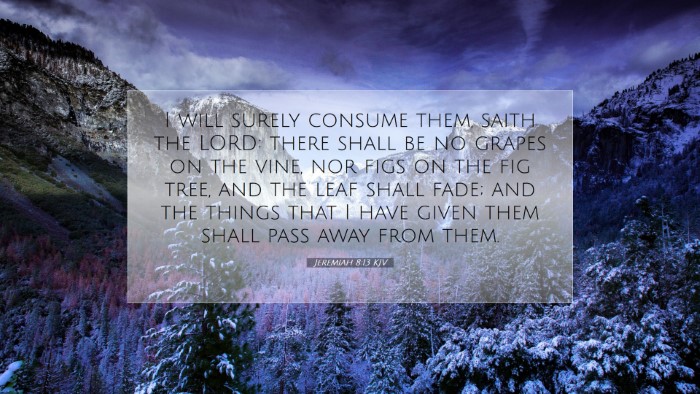Commentary on Jeremiah 8:13
"When I would gather them, saith the Lord, there are no grapes on the vine, nor figs on the fig tree, and the leaves are withered; and what I gave them is passed away from them." - Jeremiah 8:13
Introduction
The passage in Jeremiah 8:13 serves as a lamentation and a profound message of divine disappointment. This verse encapsulates God’s sorrow over Israel's spiritual state, employing vivid agricultural imagery to signify the barrenness of His people. Various public domain commentaries shed light on the implications of this verse, including insights from Matthew Henry, Albert Barnes, and Adam Clarke.
Contextual Background
This verse arises in a context where the prophet Jeremiah confronts Israel’s unfaithfulness to God. He prophesies during a time when Judah is facing the impending judgment of Babylon as a consequence of their persistent sins. The imagery of withered plants symbolizes the loss of vitality in the nation, both spiritually and physically.
Exegesis and Commentary
1. Spiritual Barrenness
Matthew Henry emphasizes the theme of barrenness as a direct result of disobedience. He notes:
- "The Lord seeks fruit from His people, but finds none to satisfy Him."
- He correlates the absence of grapes and figs with the spiritual decline of Israel, signifying their failure to produce the expected fruits of repentance and righteousness.
2. The Role of Divine Judgment
Albert Barnes comments that the passage reflects God's righteous judgment:
- "The lack of fruit is indicative of God's judgment upon them for their sins."
- He elaborates that God had provided ample opportunities for Israel to repent and be restored, but their continual rebellion led to spiritual desolation.
3. Cultural Implications
Adam Clarke provides a cultural lens by interpreting the agricultural references in relation to Israel's covenantal promises:
- "The vine and fig tree are emblematic of peace and prosperity as promised in the blessings of the covenant."
- He underscores that the absence of these fruits signifies not only physical scarcity but also spiritual deprivation, reflecting the communal breakdown in the relationship between God and His people.
Theological Implications
This verse provides several theological insights relevant to pastoral reflection, theological studies, and scholarly discourse:
- God's Expectation of Fruitfulness: The imagery illustrates God's expectation for His people to bear fruit—indicative of a living faith manifesting in good works.
- Divine Patience and Desire for Restoration: The lamentation inherent in the verse underscores God's patient desire for repentance; His disappointment is rooted in a desire for reconciliation.
- Consequences of Disobedience: The barrenness serves as a vivid reminder of the consequences faced when God's covenant is neglected, reflecting the seriousness of spiritual apathy.
Practical Application
The lessons derived from Jeremiah 8:13 are profound for contemporary believers:
- Self-Examination: Believers are called to examine their own spiritual lives for signs of fruitfulness—are we producing the fruits of the Spirit?
- Community Responsibility: Just as Israel's sin affected the whole community, church members must recognize that individual choices impact the collective body of Christ.
- Hope for Restoration: Despite the bleakness of judgment, God’s character is one of restoration; there remains hope for renewal even when spiritual barrenness prevails.
Conclusion
Jeremiah 8:13 is a poignant reminder of the relationship between God and His people—a relationship that thrives on faithfulness, obedience, and fruitful living. The reflections from Matthew Henry, Albert Barnes, and Adam Clarke elucidate the critical nature of this scripture, offering theological and practical insights that resonate with pastors, students, and theologians alike. It compels an invitation to return to the Lord, to seek spiritual renewal, and to bear the fruits of a vibrant faith.


